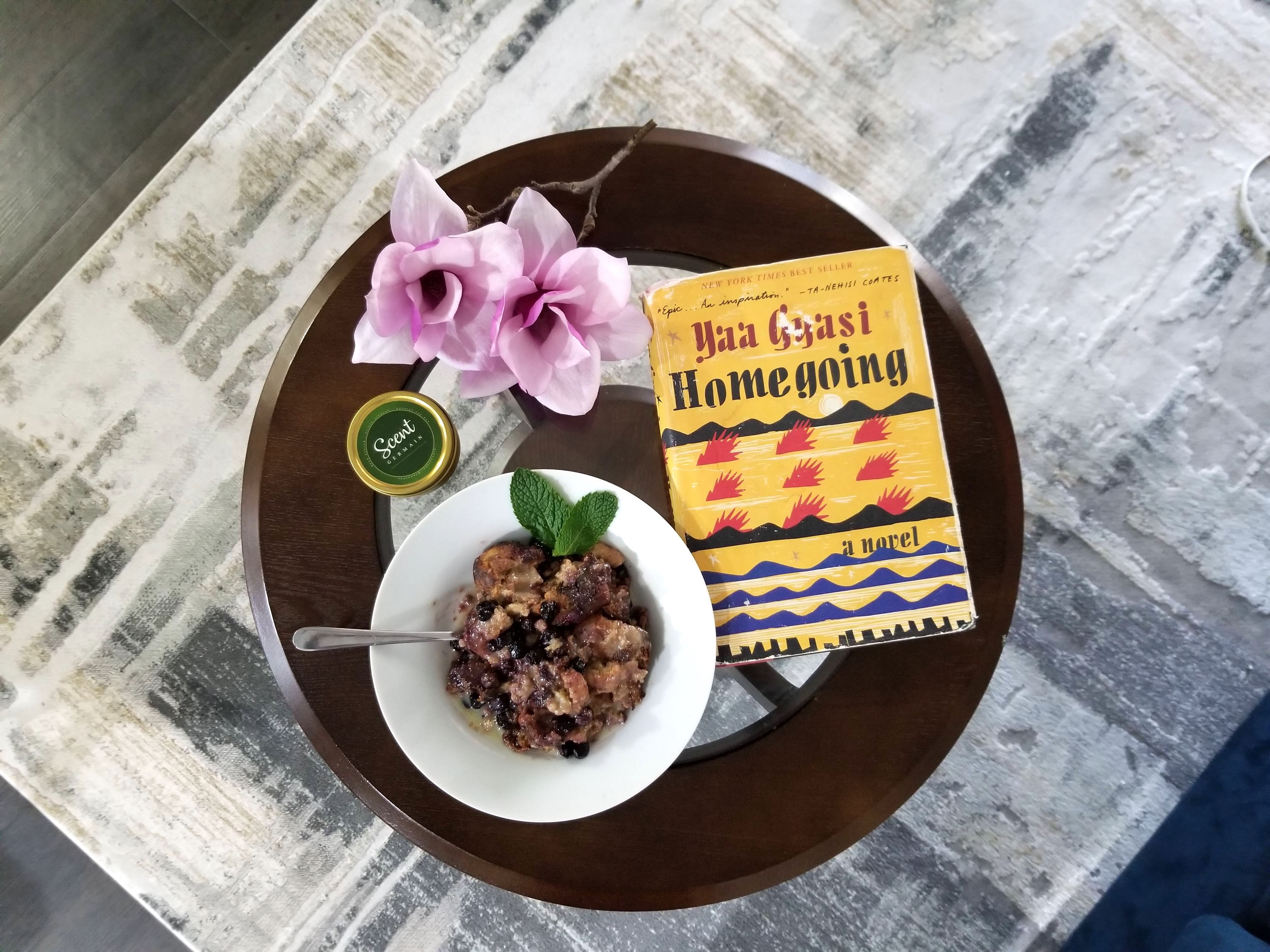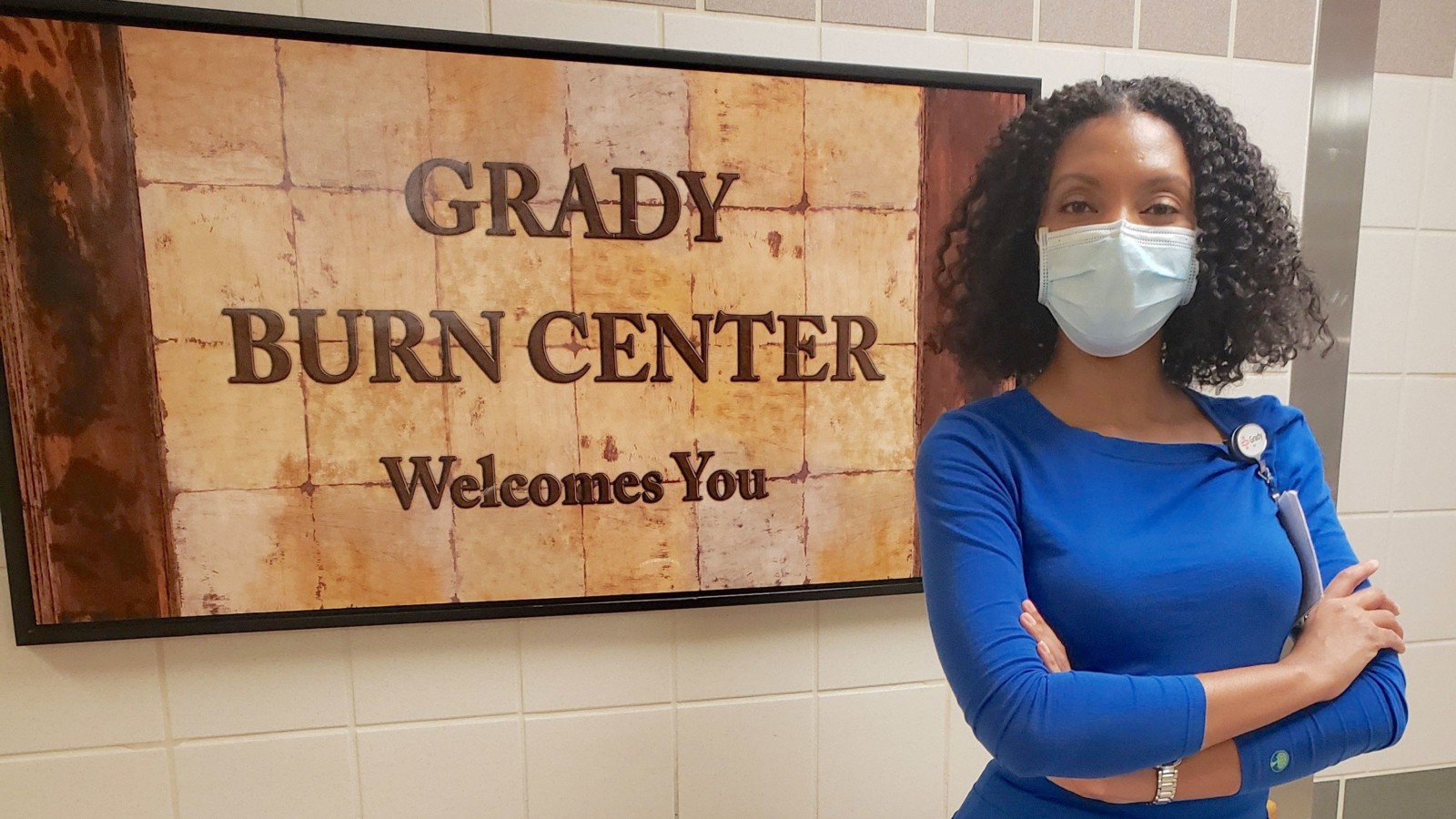“Even through the heavy PPE we see each other… The same way that we are being observant with our patients, we learned to be observant with one another.”
Ashley Pugh, RN (Atlanta, GA)
Ashley Pugh expected Grady Memorial Hospital to be a training ground like no other. Grady’s Marcus Trauma Center is one of the top five busiest in the United States and Atlanta’s premier Level 1 trauma center. The ER is the size of a small hospital. Medical fellows from across the globe come to Grady to learn how to handle the most extreme trauma cases from top medical professionals. Ashley had been working in health care since 2007, and her enthusiastic personality and love for the hands-on care of people charted her path from administrative to clinical. She was excited to take on a position as a bedside nurse in the burn unit ICU in February of 2020, but had no idea what COVID-19 had in store for her. “It very quickly became a ‘You Are Everything Nurse’ situation. I remember coming into the staff meeting and being told, ‘We are all full. Even our overflow is full, and some of your patients tonight are not burn patients.’ That’s when it hit me how serious the threat of COVID was. It changed how we did business in every way.”
Since Ashley just joined the burn unit, the pandemic exposed her inexperience. “As a new nurse, it’s intimidating. No matter how smart you are, there are just things you do not know. You have to remember that your level of competency is appropriate for your level of experience. Remind yourself who you are, that you are a competent individual, and that you’re doing the best you can.”
Ashley’s rotations were exhausting. Every day was a new challenge with COVID patients and burn victims. She leaned on the support of her fellow nurses to get her through. “Even through the heavy PPE we see each other. Even with your multiple masks and goggles, the body language is very clear. You learn the language of looking at how a person is walking, listening to their voice. The same way that we were being observant with our patients, we learned to be observant with one another. I’m proud to be in a unit that achieves that intentionally.” Ashley’s team fights the fatigue by being aware. As a small unit with 24 beds, the nurses in Ashley’s ward try to support and balance one another. By taking the time to check-in and remain supportive, they promote positive energy and create a healthy work environment.
Ashley likes to spend time cooking for self-care. Hailing from Louisiana, her recipes feed the soul. “I like to cook recipes that my grandmother taught me to comfort myself. Unplug from the media, and enjoy the quiet.” Ashley stresses the importance of variety when planning meals. “I cook what makes my body feel good and what my body wants. So if my body wants crawfish etouffee, I’ll make that; but if my body wants, you know, a fancy salad with salmon and kale and cranberries and all of those things, I’ll do that too.” The pandemic inspired Ashley to create a new recipe for, wait for it… Krispy Kreme, blueberry and white chocolate bread pudding! This creative concoction was born out of necessity. “The community was very supportive. Lots of companies donated food for us to ease the burden, sometimes we were so tired and couldn’t think to eat, but we were so appreciative and didn’t want anything to go to waste.” The hospital would receive doughnuts and they would go stale. Stale bread being the foundation for any great bread pudding, a star was born. Ashley shared the recipe with her co-workers and they loved it!

Ashley says this is an important time to journal and write down memories because the pandemic is taking precious time away from us and our elders. Now is an excellent time to reach out and collect wisdom and experiences from our loved ones. “That’s something I’ve been working on, writing down stories and writing down recipes so that I can have them. Because when you lose someone, you lose so much history, especially now with this pandemic. The Black community is losing a lot of our elders, and the food is our history.” Ashley says journaling is a great way to unplug. “I just really try to separate myself – from social media, from the internet, from anything – and just quiet the space around me so that I can reset.”
Her first year at bedside during the pandemic has given Ashley a new perspective on self-care. She cherishes and protects the time she sets aside to spend cooking and journaling as part of her mental health regime. She also makes time for therapy, and views therapy as a tool for maintenance, not only for correction. “You have to take the time for yourself and take advantage of the resources that are available.” Ashley recommends you see a mental health professional or wellness practitioner to check your mental health the same way you go to primary care for an annual checkup. She also recommends taking a break. “Use your PTO. Use your extended illness pay and do not feel guilty for taking care of yourself. You have to take time for yourself and don’t be ashamed of your own needs. You have to have balance.”
#FirstRespondersFirst Microstep
If you catch yourself saying you’re unable to practice self-care, pause and choose a new mindset.
There’s nothing selfish about taking care of your basic needs. Per Substance Abuse and Mental Health Services Administration guidelines, it’s essential to recognize that your stress management must come first. Shift your self-talk to something like “When I take care of myself in small ways, I can be my best self to take care of patients.”
Ashley’s story is part of “Unmasked: Profiles of Humanity and Resiliency,” a collection of stories from the frontlines published by the National Black Nurses Association (NBNA) in partnership with #FirstRespondersFirst. The NBNA offers therapy and wellness services through RE:SET, a free mental wellness program developed for Black nurses to help them RE:SET, recharge and widen their circle of support. Visit nbnareset.com to learn more.


